Feminists We Love: Marissa Alexander
By Aishah Shahidah Simmons and Alisa Bierria
Today is the first day of Standing Our Ground Week of Action (July 25 – August 1, 2014) in Jacksonville, FL and everywhere in support of Marissa Alexander’s case. The Free Marissa Now Mobilization Campaign is a coalition of organizations and activists that has been mobilizing people in Jacksonville, across the US and around the globe to support the call for Marissa’s freedom.
Less than two weeks ago, I had the opportunity to break bread and talk with my sister and comrade Alisa Bierria, a Free Marissa Now member based in the Bay Area, about what Marissa Alexander’s case means for feminist social movements and the current push for grassroots support for her freedom during the week of action.
Since Ms. Alexander is under house arrest, I asked Alisa if she would partner with me on a Feminists We Love feature on Marissa Alexander. Ms. Alexander’s current struggle for freedom exemplifies many aspects of The Feminist Wire’s mission and vision. We are in unwavering solidarity with the movement to free her. If you aren’t aware of Ms. Alexander’s case or if you don’t have a full grasp of what’s at stake for Ms. Alexander, and by extension all women who are or will be in similar situations in the future; we hope that after reading this conversation you will be called to action.
Brief Background:
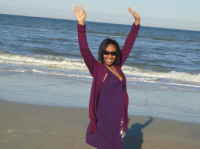 Marissa Alexander is a black mother of three from Jacksonville, FL, a loving daughter and sister, she has earned an MBA, she’s a woman of faith, and she’s a survivor of domestic violence. Nine days after giving birth to a premature child, she fired a single warning shot upwards into a wall to halt her abusive husband during a life-threatening beating. The single shot caused no injuries. Ms. Alexander’s husband, who has been arrested for domestic violence twice and previously landed Ms. Alexander in the hospital after beating her, admitted in a sworn statement that he was the aggressor, threatened her life and was so enraged that he did not know what he would do. Despite the fact that she acted in self-defense, Ms. Alexander was denied immunity from prosecution under Florida’s “Stand Your Ground” law, she was convicted, and in 2012 she was sentenced to a mandatory minimum of 20 years.
Marissa Alexander is a black mother of three from Jacksonville, FL, a loving daughter and sister, she has earned an MBA, she’s a woman of faith, and she’s a survivor of domestic violence. Nine days after giving birth to a premature child, she fired a single warning shot upwards into a wall to halt her abusive husband during a life-threatening beating. The single shot caused no injuries. Ms. Alexander’s husband, who has been arrested for domestic violence twice and previously landed Ms. Alexander in the hospital after beating her, admitted in a sworn statement that he was the aggressor, threatened her life and was so enraged that he did not know what he would do. Despite the fact that she acted in self-defense, Ms. Alexander was denied immunity from prosecution under Florida’s “Stand Your Ground” law, she was convicted, and in 2012 she was sentenced to a mandatory minimum of 20 years.
In September 2013, Marissa Alexander successfully appealed her trial, overturning her guilty verdict. She was released from prison in November 2013, and has been forced into strict house detention because, instead of dropping the case, Florida State Attorney Angela Corey has chosen to prosecute her again. Recently, on July 20th, Ms. Alexander’s request for a new Stand Your Ground hearing was denied. Her trial is scheduled to begin on December 8, 2014. Ms. Corey has stated that her office intends to pursue a tripled sentence of 60 years if Ms. Alexander is found guilty in the December trial.
Aishah: Why do you believe that the movement to free Marissa Alexander is important and why did you get involved with Free Marissa Now?
Alisa: Marissa Alexander’s sentence was the latest in a string of recent cases of black women who were being punished for defending their lives — including the New Jersey 4, CeCe McDonald, Janice Wells, and more recently, Ersula Ore – that were able to attract some level of press and public recognition. These cases highlight a pattern of failure by judges, police, prosecutors, and the public to understand black women as “legitimate” victims of violence. This is rooted in a larger legacy of anti-black racial violence, which is part of an infrastructure that prevents black women from being understood as vulnerable, victimizable, or even as “women.”
A Florida judge denied Marissa Alexander immunity from prosecution in her first “Stand Your Ground” because the judge did not believe that Marissa genuinely experienced fear when she defended her life from a man who attacked her, strangled her, and threatened to kill her. Marissa’s moral and legal status as “domestic violence victim” was officially undone in a court of law via a racialized politics of emotion.
Was it Marissa’s blackness that, for this judge, precluded the possibility of fear? Was it the fact that she effectively defended herself, that she survived? What kind of body and performance can adequately represent “fear” in the US judicial system, or in our communities? And why is the proof of fear necessary to assert one’s right to defend one’s life? Racial justice, feminist anti-violence, and anti-prison/policing movements must take the implications of this ruling seriously in order to make their work more relevant to black women’s lives.
If Marissa loses a second trial and is forced to return to prison, possibly for a mandatory 60 year sentence, then this distorted construction of black women will become even more legitimized as “truth.” The re-incarceration of Marissa Alexander will not only have a devastating impact on her life and her family, but it will sanction a larger culture of violence, surveillance, and punishment against black women and girls, and seriously damage the right of every woman to defend herself against an attack. So I joined Free Marissa Now because I want to support Marissa’s freedom and because I believe her freedom has far-ranging consequences for all black women, all survivors of domestic & sexual violence, and many others. I have heard people say that the court’s treatment of Marissa Alexander is business as usual for black people in the US, and perhaps that’s true. But I’m not willing to concede the fight for her freedom. Marissa didn’t concede, why should we?
Aishah: What organizing possibilities does the movement to free Marissa Alexander raise?
Alisa: Marissa Alexander said in a 2012 interview, “This is my life I’m fighting for. This is my life. It’s my life and it’s not for entertainment. This is my life. If you do everything to get on the right side of the law, and it’s a law that does not apply to you, where do you go from there?” That’s such a potent statement. First, she emphasizes her own humanity in the midst of a court system that seems committed to destroying her, and a media and political spectacle that could easily lose track of her subjectivity. Second, she names the dead-end status of pro-criminalization policies that allegedly are designed to protect us. Finally, she asks the key, open-ended question: “Where do you go from there?” That question is provocative and I believe it calls for a politics of invention; of creating — or in some cases, re-discovering or re-legitimizing — whole new systems of knowing, of doing, of understanding who we are and where we need to go from here. It challenges us to formulate anti-violence strategies that go beyond “calling 911,” to create new political coalitions and frameworks that we hadn’t considered before, and to craft projects that shift the foundation of knowledge itself such that the intrinsic value of black women’s lives has no need for defense or justification, it just is.
Aishah: Given what’s at stake and the prevalence of domestic violence in this country, why do you think Ms. Alexander’s case hasn’t provoked more attention and commentary from US anti- domestic violence organizations?
Alisa: I’ve organized within a network of service providers, advocates, and activists working to support survivors of domestic and sexual violence on and off for about 20 years. While Free Marissa Now has seen some success in finding strong supporters in the anti-violence community and getting most of the state coalitions against domestic violence to sign a petition that endorses the call to free Marissa Alexander, we have also struggled with this community. I have heard anti-violence organizations in Florida and elsewhere express fear in taking a public stand on behalf of Marissa’s freedom. I think there are several reasons for that. First, most of these programs provide “victim services,” and human services are ridiculously underfunded in this country. Those organizations are set up to prioritize their funding over political principles in a context of scarcity, which undermines their political autonomy. Also, anti-violence funding is sometimes administered through local or state criminal justice offices, which ends up being a conflict of interest if those same offices are prosecuting survivors that organizations are (or should be) supporting. The other issue is that anti-violence politics has veered towards pro-criminalization policies over the last 20-30 years. The Violence Against Women Act, passed in 1994, was part of a larger Crime Bill that was instrumental in building the current prison crisis. My hope is that Marissa Alexander’s struggle for freedom will inspire this community of workers, feminists, and advocates to seriously question the impact that funding priorities and pro-criminalization policies has on our ability to support survivors — especially black survivors — and challenge us to urgently address these problems in our organizations and social movements.
Aishah: What is the Standing Our Ground Week of Action and what do the organizers hope will emerge from the week of events?
Alisa: Free Marissa Now, along with many wonderful allies in the South and across the US, is organizing a convergence to raise awareness in Jacksonville, FL, across the US, and around the world about Marissa Alexander’s case. The convergence is called Standing Our Ground Week of Action and it’s scheduled for July 25th – August 1st. We do not want Marissa’s case to move forward behind closed doors, where violence in our homes and behind prison walls usually unfolds. Her case requires a strong public showing of support for her freedom in order to highlight, and hopefully destabilize, the racial and gender violence that is embedded in Florida’s prosecution. We also want to raise awareness that Marissa Alexander is one of many thousands of survivors of domestic and sexual violence who are incarcerated, a fact that Marissa herself has emphasized. We hope to illuminate the connections between reproductive violence, domestic and sexual violence, and mass incarceration, because these three issues fuel each other and require strong coalitions to seriously address. And we want to use visual art, music, direct action, and political education to build a powerful and beautiful movement to free Marissa Alexander that is rooted in Jacksonville, and spreads far and wide.
Aishah: How can people who are not based in Jacksonville, FL directly participate in the week of action? What are other ways that people can support Ms. Alexander’s case?
Alisa: There are so many ways to support Marissa Alexander’s freedom!
- Organize fundraisers and donate to the Marissa Alexander Legal Defense Fund, which is especially important since she’ll probably accrue more legal fees on the way to her Dec 8th trial. DONATE HERE!
- Shop at the Free Marissa store! There are lots of great things to purchase such as buttons, stickers, magnets, and other art, and all proceeds go to the Marissa Alexander Legal Defense Fund.
- Get the word out! Table in your community, do teach-ins in your schools and neighborhoods, organize rallies and marches, or hold a letter-writing party. Resources here.
- Attend solidarity events this week in Chicago, Phoenix, and Oakland. Organize a solidarity event and let us know at freemarissanow@gmail.com so we can help promote it.
- Get down on social media: participate in #SelfiesForSelfDefense by posting a photo of yourself with a sign expressing support for Marissa. We will print them and send copies to her. Also, connect with Free Marissa Now on facebook, twitter, and tumblr to stay updated on the case and the movement.
- Write to Marissa to tell her don’t give up and we are pulling for her! Her address is: Marissa Alexander, P. O. Box 23872, Jacksonville, FL 32257
Aishah: Finally, why is Marissa Alexander a Feminist you love?
Alisa: I don’t know if Marissa Alexander self-identifies as a feminist. I hope to talk to her about that someday. However, from my perspective, her actions to value and defend her life without apology are deeply core to a black feminist ethic. Her ability to make critical life-saving choices, her unapologetic rejection of the State Prosecutor’s original so-called plea deal of three years in prison because she did not believe she did anything wrong, and her consistent ability to survive nearly three years of incarceration and ongoing prosecution with grace and faith has been a source of light for me and many others. The complexity of her choices transcends tired tropes like “strong black woman” or “permanent victim.” I hope feminist, racial justice, and other social movements can learn from Marissa’s practice of continuously affirming her full, complex, beautiful life, and reflect her insistence that black women’s lives matter.
Alisa Bierria is a member of the Free Marissa Now core team and INCITE! Women of Color & Trans People of Color Against Violence. She is working with INCITE! to organize a national conference, Color of Violence 4 – Beyond the State: Inciting Transformative Possibilities, March 26-29, 2015, Chicago. Alisa is also the Associate Director of the Center for Race and Gender at UC Berkeley, and a PhD candidate in Philosophy at Stanford University.
Aishah Shahidah Simmons is the creator of the internationally acclaimed film NO! The Rape Documentary and an Associate Editor of The Feminist Wire. She is working with Black Women’s Blueprint on their Truth and Reconciliation Commission on Black Women and Sexual Assault. Aishah also teaches graduate and undergraduate courses in Women’s and LGBT Studies at Temple University. She was an O’Brien Distinguished Visiting Professor at Scripps College during their 2014 Spring Semester.

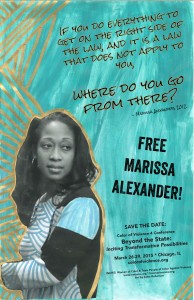
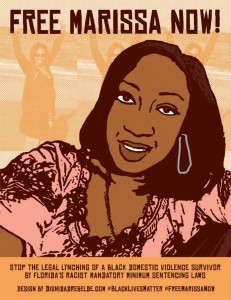
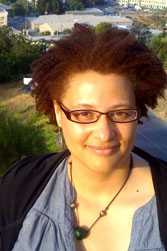



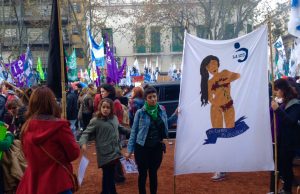
Pingback: Stand Your Ground: On Marissa Alexander and Fear – first day walking